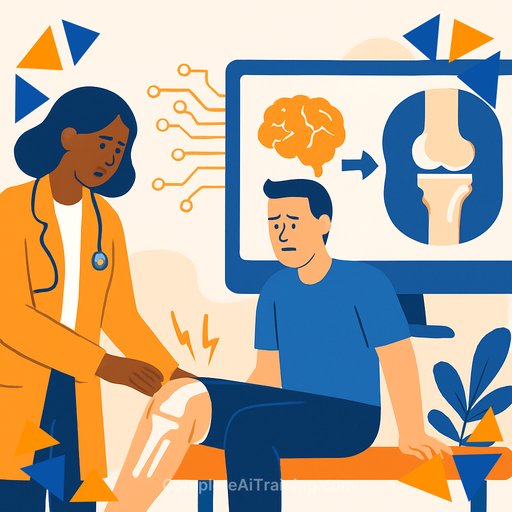AI Breakthrough in Knee Replacement: Predicting and Managing Postoperative Pain with Machine Learning
AI-driven machine learning predicts severe pain risk after knee replacement, enabling personalized pain management. This breakthrough aims to improve recovery and patient care.

AI Advances Pain Management in Knee Replacement Surgery
A recent study awarded at the 50th Annual Meeting of the American Society of Regional Anesthesia and Pain Medicine (ASRA) showcases how artificial intelligence (AI) can improve pain management after knee replacement surgery. The research applied machine learning to classify patient pain patterns and predict those at risk for severe postoperative pain.
This recognition by ASRA highlights the commitment to advancing patient care through innovative research. The study was conducted by a team at the Hospital for Special Surgery (HSS), leveraging their extensive patient database to analyze factors influencing pain outcomes.
Predicting Pain Outcomes with Machine Learning
More than one million knee replacements occur annually in the U.S., a number that continues to grow. Understanding individual patient pain trajectories is crucial to improving recovery experiences. Using AI, the researchers analyzed variables such as age, gender, body mass index (BMI), and pre-surgical pain levels to identify patients more likely to experience severe pain post-surgery.
The study involved 17,200 patients who underwent total knee replacements at HSS between April 2021 and October 2024. Two distinct pain archetypes emerged from unsupervised machine learning: one group experienced severe, hard-to-control pain, while the other had relatively manageable pain levels.
Key Risk Factors Identified
Supervised machine learning pinpointed several predictive factors for severe postoperative pain:
- Younger age
- Greater physical and mental impairment
- Higher BMI
- Preoperative use of opioids or gabapentinoids
These findings allow healthcare professionals to identify high-risk patients early and adjust pain management plans accordingly.
Looking Ahead: Enhancing Patient Outcomes with AI
While this study focused on the immediate postoperative period, ongoing research at HSS aims to track patient pain and recovery over longer durations. The goal is to discover effective strategies for managing pain before surgery, during the operation, and afterward, especially for those at higher risk.
By integrating AI into clinical practice, care teams can create more personalized and effective pain management protocols, ultimately improving patient recovery and satisfaction.
About Hospital for Special Surgery (HSS)
HSS is a leading academic medical center specializing in musculoskeletal health. It ranks No. 1 nationally in orthopedics for the 15th consecutive year and holds top positions in rheumatology and pediatric orthopedics according to U.S. News & World Report (2024-2025).
Founded in 1863, HSS boasts the lowest readmission, infection, and complication rates for orthopedic care in the nation. Its commitment to excellence is evident through multiple recognitions, including Magnet Recognition for nursing service.
HSS operates multiple facilities across New York, New Jersey, Connecticut, and Florida. Beyond patient care, it leads in research, innovation, and education with over 200 clinical investigators and a dedicated Research Institute focused on advancing musculoskeletal health.
For professionals interested in AI applications in healthcare, exploring resources on Complete AI Training can provide further insights into how machine learning is transforming patient care.
Reference
Classification and stratification of patient pain archetypes following total knee arthroplasty: a machine learning approach
Justin Chew, MD, PhD, Junying Wang, Alexandra Sideris, PhD, Victoria Xu, Daniel Maalouf, MD, MPH, Stavros Memtsoudis, MD, PhD, MBA, Jashvant Poeran, MD, PhD, Jiabin Liu, MD, PhD.




